

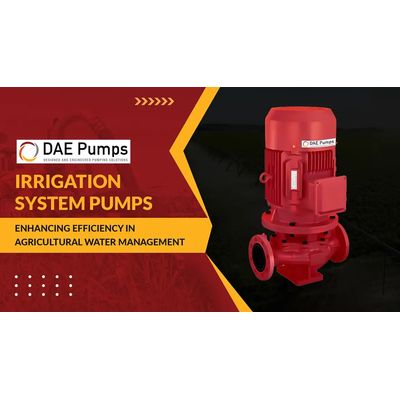
Irrigation System Pumps: Enhancing Efficiency in Agricultural Water Management
In modern agriculture, efficient water management is a cornerstone of productivity and sustainability. An irrigation system pump plays a critical role in ensuring that crops receive adequate water, enabling farmers to optimize yields and conserve resources. However, maintaining efficient water distribution across vast agricultural lands is no small feat. Challenges such as fluctuating water pressure, uneven distribution, and high operational costs can hinder agricultural efficiency.
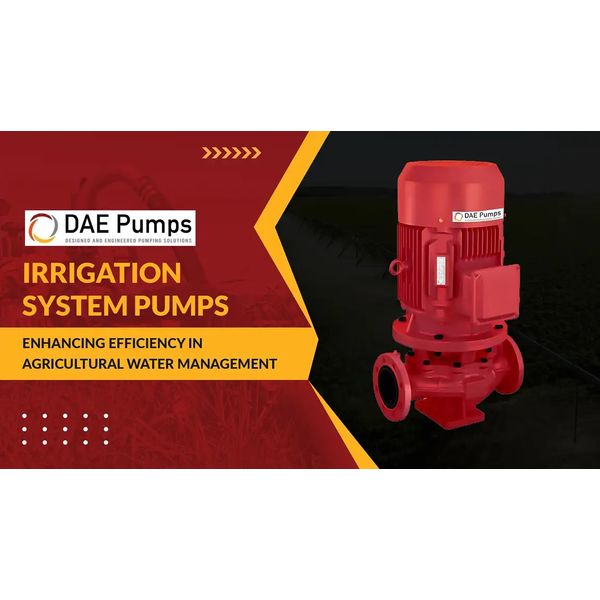
Enter DAE Pumps, a leading provider of high-performance irrigation pump systems designed to tackle these challenges head-on. With advanced solutions tailored to meet the needs of modern farming, DAE Pumps is setting a new benchmark in agricultural water management. This blog delves deep into the world of irrigation system pumps, exploring their types, applications, and benefits while highlighting how DAE Pumps stand out in the market.
Efficient irrigation pump systems are not just about technology but also about their impact on global food security. As water scarcity becomes a pressing issue worldwide, investing in innovative solutions like irrigation pump systems ensures a sustainable approach to farming. This blog aims to provide an in-depth understanding of how these systems function and why they are essential for agricultural success.
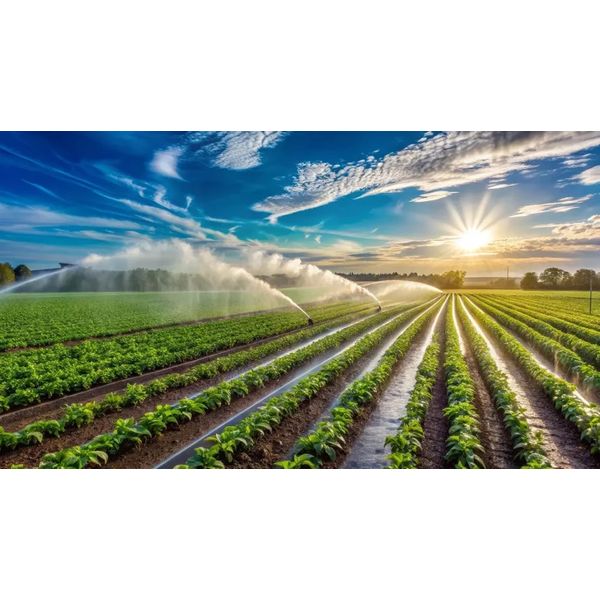
Defining Irrigation System Pumps
An irrigation system pump is a mechanical device that transfers water from a source, such as a reservoir, well, or river, to an irrigation system. It ensures effective water distribution to crops or landscaped areas, playing a critical role in modern agricultural and landscaping operations. By regulating water flow and pressure, irrigation system pumps help achieve precision watering, making them indispensable for both small-scale and large-scale irrigation needs.
Key components of an irrigation system pump include:
- Pump Casing: Encloses the pump mechanism, protecting its components and directing water flow efficiently.
- Impellers: Convert mechanical energy into kinetic energy, driving water movement through the system.
- Suction and Discharge Ports: Enable water intake and release to maintain a consistent flow.
- Motor: Provides the necessary energy to power the pump, ensuring optimal operation.
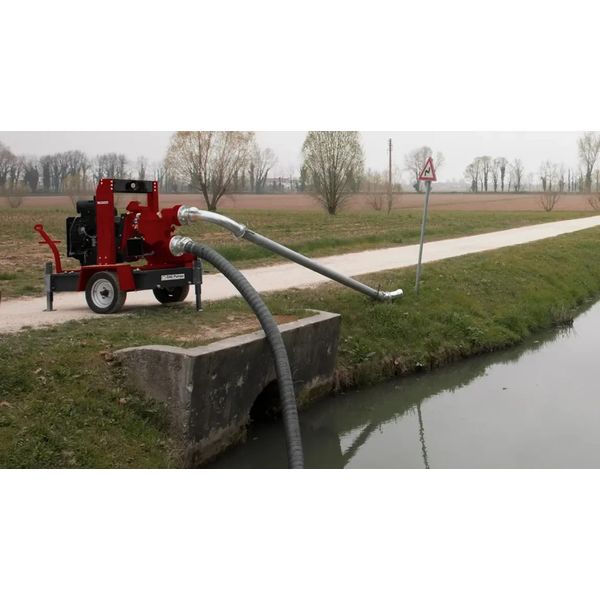
Irrigation pump systems are crucial for delivering a consistent and efficient water supply tailored to the specific needs of different crops, soil types, and landscapes. By maintaining controlled water flow and pressure, these systems:
- Prevent issues like over-irrigation or under-irrigation that can damage crops or landscapes.
- Conserve water resources by optimizing distribution and minimizing waste.
- Support sustainable farming and landscaping practices, contributing to long-term environmental health.
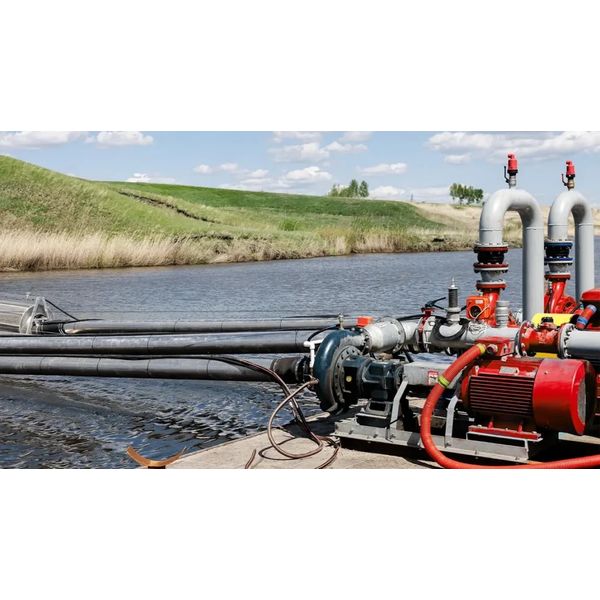
While irrigation system pumps are widely recognized for their role in agriculture, their applications extend far beyond farming. They are vital in industries such as:
- Landscaping: Ensuring proper watering for lawns, gardens, parks, and golf courses.
- Horticulture: Facilitating precise watering in greenhouses, nurseries, and commercial flower production.
- Livestock Farming: Providing water for animals and assisting in cleaning and maintenance operations.
Additionally, irrigation system pumps are indispensable in arid and semi-arid regions where traditional water transport methods are inadequate. Their versatility and efficiency enable these systems to adapt to diverse industrial requirements and geographic conditions, making them a cornerstone of modern water management strategies.
Common Irrigation Pumps
The selection of an irrigation pump system depends on various factors, including the water source, irrigation method, and specific application needs. Below are the most commonly used types of pumps in irrigation systems:
- Centrifugal Pumps
- Functionality: Centrifugal pumps use rotating impellers to generate a flow of water by converting mechanical energy into kinetic energy.
- Ideal Applications: Best suited for surface-level water sources such as lakes, rivers, and canals.
- Advantages: They are easy to maintain, highly versatile, and reliable. They are available in different sizes, making them suitable for small-scale and large-scale farming operations. Their simplicity and efficiency often make them the go-to choice for general irrigation needs.
- Submersible Pumps
- Functionality: Submersible pumps are designed to operate underwater, often placed directly in wells or boreholes.
- Ideal Applications: Suitable for accessing deep water sources located underground, such as aquifers or boreholes.
- Advantages: Submersible pumps, known for their durability and high efficiency, are critical in regions with deep water tables. They provide a dependable solution for extracting water from significant depths and are designed to handle challenging conditions while minimizing energy loss.
- Booster Pumps
- Functionality: Farming pumps are used to increase water pressure within an irrigation system, ensuring consistent delivery across the entire network.
- Ideal Applications: This is essential for large-scale farms with extensive piping networks and systems with hilly terrains or varying elevations.
- Advantages: Provide uniform water pressure, making them ideal for areas where natural water pressure is insufficient to reach distant or elevated areas. They are especially valuable for ensuring the effective performance of sprinklers, drip emitters, and other irrigation components.
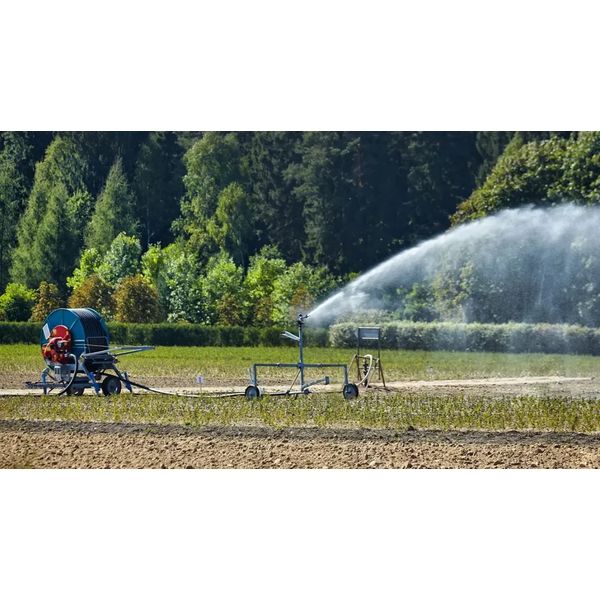
A booster pump for irrigation systems is a vital component in setups where water pressure needs enhancement. Insufficient pressure can lead to uneven watering, which may harm crop health and reduce yields. Booster pumps ensure:
- Consistent Water Delivery: Water is evenly distributed across long distances and multiple zones, preventing overwatering or underwatering.
- Efficient Operation: They support the performance of other irrigation components, such as sprinklers and drippers, by maintaining the necessary pressure for optimal functionality.
- Adaptability: This feature is particularly beneficial for large-scale farms, areas with naturally low water pressure, and irrigation layouts with complex or hilly topographies.
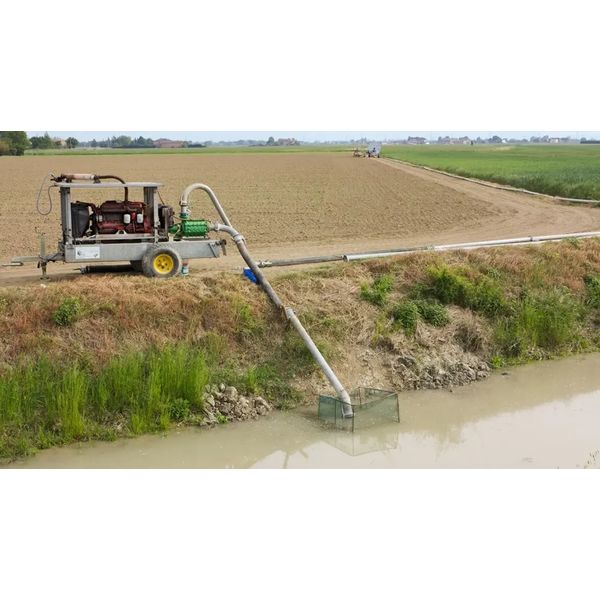
Selecting the right type of irrigation system pump is critical to achieving effective and efficient water management. Several factors must be taken into account:
- Water Source: The location, depth, and type of water source (surface-level or underground) influence the type of pump required.
- Distance and Pressure Needs: The distance water must travel, and the pressure required to cover the irrigation area are crucial in determining the pump’s capacity and design.
- Crop and Irrigation Method: The specific water requirements of the crops and the type of irrigation system (e.g., drip, sprinkler, or flood) impact the choice of pump.
Given the technical considerations and potential complexities, consulting an irrigation expert is highly recommended. Professionals can assess the unique needs of your agricultural or landscaping project, evaluate water availability, and recommend the most suitable irrigation pump system. Expert advice ensures you invest in a system that meets your operational requirements while optimizing water use, energy efficiency, and long-term productivity.
By selecting the appropriate pump and effectively leveraging its features, farmers and operators can significantly improve irrigation performance, conserve resources, and boost crop yields.
Applications in Agriculture
Farming pumps are vital for a broad range of agricultural activities, ensuring water is delivered efficiently to meet various needs. Key applications include:
- Crop Irrigation: Farming pumps play a critical role in delivering water directly to plants’ root zones, ensuring even hydration and fostering healthy growth.
- Livestock Watering: Pumps provide clean, fresh water to animals, essential for maintaining their health and productivity.
- Drainage: These systems help remove excess water from fields to prevent waterlogging, which can damage crops and reduce soil quality.
Beyond these traditional applications, farming pumps are increasingly utilized in modern precision irrigation techniques such as drip irrigation and sprinkler systems. These advanced methods allow water to be distributed in controlled amounts, directly targeting specific areas. By delivering water efficiently, they minimize waste, save resources, and maximize productivity, particularly in water-scarce regions.
Investing in high-quality irrigation pump systems provides substantial advantages to farmers, both in the short and long term. Some of the most notable benefits include:
Water Conservation
- Advanced irrigation system pumps are designed to optimize water usage, significantly reducing waste.
- Precision irrigation methods ensure water is directed only to areas that need it, preventing unnecessary runoff or evaporation.
- Effective water management can make the difference between a successful harvest and a failed one in drought-prone or water-scarce regions.
Improved Crop Yields
- A reliable and consistent water supply is essential for healthy plant growth and high yields.
- By reducing the risk of water stress or drought-related crop failures, irrigation pump systems enhance productivity.
- Well-irrigated crops tend to produce higher-quality yields, which fetch better prices in the market and boost a farmer’s profitability.
Reduced Operational Costs
- Modern pumps are increasingly energy-efficient, lowering electricity or fuel consumption and reducing operating expenses.
- Durable and high-performing pump systems require less frequent maintenance and replacement, saving on repair costs.
- The resources saved through efficient water and energy use can be reinvested in other critical farm aspects, such as pest control, soil enhancement, and crop diversification.
A large-scale farming operation in drought-prone California faced significant challenges with uneven water distribution and escalating operational costs. The farm implemented DAE’s advanced irrigation pump systems to address these issues, yielding impressive results:
- A 30% reduction in water usage is achieved by improving water delivery precision and minimizing waste.
- Consistent water pressure across all irrigation zones, ensuring even and reliable water distribution.
- Notable energy savings, thanks to DAE’s focus on energy-efficient pump designs.
This case study highlights the transformative impact of choosing the right irrigation pump system. Not only did the farm enhance its overall efficiency, but it also contributed to sustainable water use—a critical priority in a region frequently impacted by drought.
Efficient irrigation system pumps, such as those offered by DAE, exemplify how the right equipment can revolutionize farming operations. By conserving water, improving yields, and cutting costs, these systems empower farmers to thrive in challenging conditions while promoting sustainable agricultural practices.
Importance of Booster Pumps
In many irrigation setups, natural water pressure from the source is insufficient to deliver water effectively across large or complex systems. This is particularly true for areas with uneven terrain, distant fields, or systems with multiple zones. A booster pump for irrigation systems addresses these challenges by:
- Enhancing Water Pressure: They increase pressure levels to ensure water reaches even the most remote or elevated areas of an irrigation system.
- Ensuring Uniform Water Distribution: Booster pumps help maintain consistent water pressure, enabling uniform delivery to all parts of the system. This ensures that plants or landscaped areas receive the necessary amount of water for healthy growth.
- Supporting Other Irrigation Components: From sprinklers to drip emitters, a booster pump enhances the performance of other irrigation system components by providing the necessary pressure for efficient operation.
Key Features to Look For
Choosing the right booster pump for irrigation systems can significantly improve efficiency and longevity. Consider these essential features:
- High Efficiency: Look for pumps designed to deliver maximum output with minimal energy consumption. Energy-efficient models help lower operating costs over time.
- Durability: Select pumps made from corrosion-resistant and wear-resistant materials, especially for use in challenging environments or with abrasive water sources.
- Ease of Maintenance: Opt for pumps with simple designs and easily accessible components to minimize downtime during servicing.
- Compatibility: Ensure the pump can integrate seamlessly with your existing irrigation system, including pipes, sprinklers, and control systems.
Why Choose DAE Pumps?
DAE Pumps stands out as a leader in providing reliable and efficient booster pumps for irrigation systems. Their products are distinguished by:
- Advanced Technology: DAE designs leverage cutting-edge innovations to maximize efficiency and performance.
- Robust Construction: Built for durability, DAE pumps can withstand the harsh conditions of agricultural and industrial environments.
- Customizable Options: DAE offers tailored solutions to meet the specific needs of different farming operations, ensuring every customer gets the perfect fit for their irrigation system.
In addition to high-quality products, DAE Pumps provides exceptional customer support, including installation guidance and ongoing maintenance tips. This ensures that farmers and operators get the best possible return on their investment.
Factors to Consider
Selecting the right irrigation system pump is a critical decision that directly impacts system performance and efficiency. Key considerations include:
- Flow Rate: Determine the volume of water the pump can deliver per unit of time. The required flow rate depends on the size of the irrigation system and the water needs of the crops or landscaping.
- Pump Size: Larger pumps are necessary for high-volume or large-scale irrigation systems, while smaller pumps suffice for targeted or localized applications.
- Irrigation System Type: Drip, sprinkler, and flood irrigation systems each have unique requirements for flow and pressure, making it essential to match the pump to the system type.
Matching Pumps to Agricultural Needs
To ensure optimal results, farmers should assess several factors when selecting a pump:
- Water Source: Evaluate the availability, quality, and location of the water source. Surface water, wells, or reservoirs may require different pump configurations.
- Irrigation Area Size and Layout: Consider the total area to be irrigated, including its topography and distance from the water source. Larger or uneven areas may require pumps with higher pressure capabilities.
- Pressure and Flow Requirements: Understand the system’s specific pressure and flow needs to maintain uniform water delivery.
- Energy Efficiency: Energy-efficient models reduce long-term operational costs, especially for large systems.
Given the complexities involved in selecting the right pump, consulting experts can streamline the decision-making process. Industry leaders like DAE Pumps offer an extensive range of irrigation pump systems designed to meet diverse agricultural needs.
DAE’s team of specialists works closely with farmers to evaluate their specific challenges and recommend tailored solutions. From identifying the ideal pump type to providing installation and maintenance support, DAE Pumps ensures farmers get the most efficient and cost-effective systems for their operations.
By leveraging expert advice and advanced equipment, farmers can enhance water use efficiency, maximize crop yields, and reduce operational costs, ultimately achieving more sustainable and profitable agricultural practices.
Irrigation system pumps are the backbone of modern agricultural water management. By ensuring efficient water distribution, these systems empower farmers to conserve resources, reduce costs, and enhance crop yields. The right choice of equipment, from centrifugal and submersible pumps to booster pumps, can make all the difference.
For farmers seeking reliable and high-performance solutions, DAE Pumps offers an extensive range of irrigation pump systems designed to meet diverse agricultural needs. Explore DAE’s offerings today and take the first step toward revolutionizing your water management practices.
As agriculture continues to evolve, so must the technologies supporting it. Farmers can secure a sustainable and prosperous future by investing in advanced irrigation pump systems and partnering with industry leaders like DAE Pumps.
